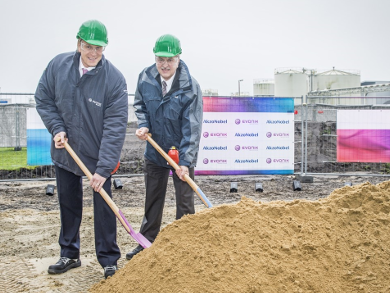Evonik and AkzoNobel broke ground to officially start the construction of the new membrane electrolysis plant in Ibbenbüren, Germany . The new facility is due to come on stream by the fourth quarter of 2017, with an annual nameplate capacity of around 130,000 metric tons of potassium hydroxide solution and approximately 82,000 metric tons of chlorine. The two chemical companies established a production joint venture in June 2015 for the manufacture of chlorine and potassium hydroxide solution at the AkzoNobel site in Ibbenbüren.
After the completion of the membrane electrolysis, Evonik will take the new plant’s potassium hydroxide solution for commercialization and processing at its own site in Lülsdorf, Germany, where it processes potassium hydroxide solution into potassium carbonate (potash). AkzoNobel will commercialize the chlorine and hydrogen produced as a result of electrolysis at the new plant, or will process these products directly at the Ibbenbüren site. All previous production of chlorine, potassium hydroxide and caustic lye using mercury-based amalgam electrolysis has to be discontinued by the end of 2017 due to legislative requirements.
Picture: (left to righ) Dr. Ralph Sven Kaufmann, Member of the Executive Board of Evonik Industries,
Werner Fuhrmann, Member of the AkzoNobel Executive Committee responsible for Specialty Chemicals. © Evonik




